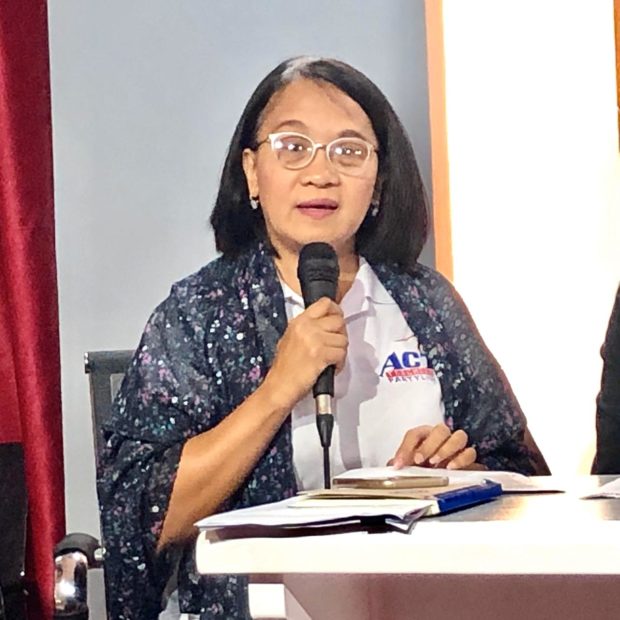
FILE PHOTO: ACT Rep. France Castro during the weekly press briefing at the House of Representatives on Thursday, Nov 21, 2019. INQUIRER.net file photo / Noy Morcoso
MANILA, Philippines — A Makabayan legislator said on Thursday that the 14 agreements struck between the Philippine team and Chinese officials during President Ferdinand Marcos Jr.’s state visit to China should be made public for transparency’s sake.
France Castro, a representative for the Alliance of Concerned Teachers, said that Marcos has to make the transactions available to the public so Filipinos can examine them closely. Castro is concerned that the terms of the deals will be kept secret.
During their visit, Marcos and Xi Jinping, the president of China, signed various agreements and discussed a wide range of topics, including the possibility of restarting oil exploration negotiations.
READ: Xi to Marcos: China ready to resume oil, gas talks
“Ayaw natin na may mga tinatagong agreements sa mamamayan lalo na kapag makapangyarihang dayuhan ang kakasunduan tulad ng ginawang pagtatago sa kasunduan sa China ng administrasyong Duterte,” Castro said.
(We don’t want agreements hidden from people, especially when dealing with foreign superpowers as the previous administration did with China.)
“The Kaliwa and Chico river dam deals with China even reached the Supreme Court and the court warned the Duterte administration against the use of such confidentiality clauses in loan agreements,” she added.
Castro was referring to the questions raised against the Kaliwa Dam before the Supreme Court, mainly due to its possible effect on the environment surrounding it, particularly in Infanta, Quezon, as it is situated in an area considered as part of the Dumagat tribe’s ancestral domain.
READ: Kaliwa dam project questioned at SC
Kaliwa Dam, seen to ensure water supply for Metro Manila and nearby provinces, is a Chinese-funded project. While the past administration hailed the partnership with China as it helps the country, several sectors, including the Makabayan bloc, warned that the contract contains onerous provisions that place national security and patrimony in danger.
Former senior associate justice Antonio Carpio also revealed in 2019 that China could effectively seize the gas resources in Reed Bank if the Philippines cannot pay back its loans.
READ: China could seize gas in Reed Bank if PH can’t pay loans – Carpio
Castro said she hoped the deals entered in by the Marcos administration differed from those done during the time of his predecessor, former president Rodrigo Duterte.
“We hope that the 14 deals signed in China would be nothing like the Kaliwa and Chico river dam deal which contains provisions limiting the contractors to Chinese companies and disqualifying Filipinos, imposing a confidentiality clause, requiring the Philippines to waive any defense on the basis of sovereignty over its patrimonial assets, and imposing that any disputes shall be resolved by a Chinese tribunal in China and Hongkong using Chinese laws,” Castro said.
“It must also be noted that there is a provision in the 1987 Constitution and a Constitutional Commission transcript stating that loan agreements must be submitted to Congress before they are executed and we hope that the recently signed loan agreements with China would be forwarded to Congress for scrutiny,” she added.
Among the deals signed during Marcos’ state visit are the following:
- Communication mechanism on maritime issues between the two foreign ministries
- Joint action plan for 2023-2025 on agriculture and fisheries cooperation
- Memorandum of Understanding (MOU) on Belt & Road Initiative
- Handover of certificate for PH-Sino Center for Agricultural Technology-Technological Cooperation Phase III
- MOU on digital information and communications technology cooperation
- Protocol of phytosanitary requirements for the export of fresh durians from Philippines to China
- Handover of certificate of two China-aid bridge projects in Metro Manila
- Framework agreement for the RMB-portion of the loan financing for thee priority projects of DPWH
- Four loan agreements for mixed-credit financing (USD-RMB) of three priority bridge projects of DPWH
- MOU on tourism
- MOU on electronic commerce cooperation
- MOU on Development Cooperation Plan 2023-2025
- Agreement on economic and technical cooperation
- Mutual recognition agreement between Bureau of Customs and Chinese counterpart on authorized economic operator program
READ: Manila, Beijing to ink 14 pacts
Castro believes more details should be made public about these deals.
“At the end of the day, it is the Filipino people who will benefit or suffer due to these new deals with China and it is but right for us to know the details of these deals,” Castro said.
RELATED STORY:
In the know: 14 bilateral deals PH inked with China during Marcos Jr.’s state visit